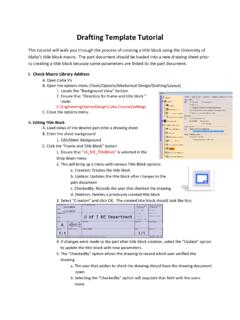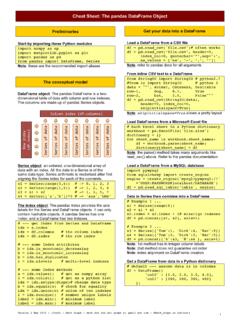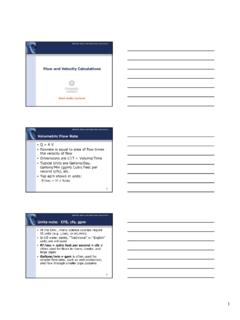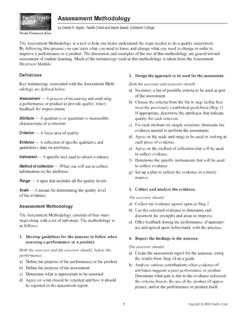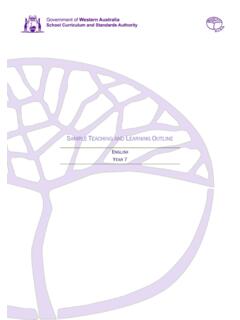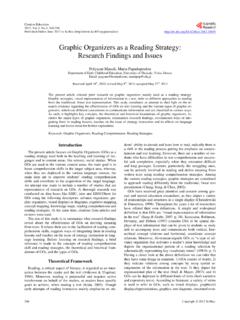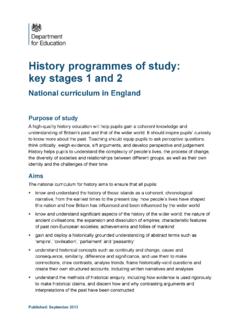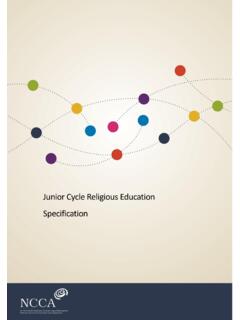Transcription of A Review of Narrative Methodology - University of Idaho
1 A Review of Narrative Methodology M Mitchell and M Egudo Land Operations Division Systems Sciences Laboratory DSTO-GD-0385 ABSTRACT This annotated bibliography focuses on the various approaches to studying Narrative . It covers the approaches to Narrative in an interdisciplinary manner, including the fields of psychology, sociology, linguistics, philosophy, anthropology, organisation studies, and history. Narrative is an interpretive approach in the social sciences involving storytelling Methodology . The story becomes an object of study, focusing on how individuals or groups make sense of events and actions in their lives.
2 The theoretical underpinnings to Narrative approaches are outlined as are the applied benefits of storytelling such as how Narrative conveys tacit knowledge, how it can enable sense making, and how it constructs identity. The study aims to explore the potential of Narrative as a research tool for enhancing Army s understanding of knowledge acquisition in the context of Battle Command Training. RELEASE LIMITATION Approved for public release Published by DSTO Systems Sciences Laboratory PO Box 1500 Edinburgh South Australia 5111 Australia Telephone: (08) 8259 5555 Fax: (08) 8259 6567 Commonwealth of Australia 2003 AR 012-965 Submitted: January 2003 Published: November 2003 APPROVED FOR PUBLIC RELEASE A Review of Narrative Methodology Executive Summary This bibliography outlines how the Narrative approach can be used as an alternative for the study of human action.
3 Narrative is an interpretive approach in the social sciences and involves using storytelling Methodology . The story becomes an object of study, focusing on how individuals or groups make sense of events and actions in their lives. Researchers capture the informant s story through ethnographic techniques such as observation and interviews. This method is said to be well suited to study subjectivity and the influence of culture and identity on the human condition. The literature search has covered topics ranging across Narrative , Narrative theory, the use of storytelling and sense making. The search highlighted a growing trend in the use of the Narrative approach across disciplines such as psychology, sociology, anthropology, linguistics, organisation studies and history.
4 Key search terms used were: Narrative , storytelling , sense making , Narrative and organisation , Narrative and organisation studies , stories , discourse analysis , organisation learning , and organisation decision making . Articles on historical narratives and Narrative therapy in psychology were excluded, as they were not relevant to the study. Articles on organisation studies focusing on change, culture, identity and tacit knowledge transfer through story were found useful in the research. The study aims to explore the potential of Narrative as a research tool for enhancing Army s understanding of knowledge acquisition in the context of Battle Command Training.
5 This bibliography therefore provides a substantial reference point to Review the literature regarding this Methodology . References in the bibliography allow researchers to identify with ease the theoretical grounding to the approach, and Review alternative positions to the study of Narrative . The case studies included provide examples of how research is conducted within this field, and thus the bibliography can act to support researchers in developing this research tool for understanding the context of formal and informal learning within training arenas.
6 Furthermore, it can serve as a reference point for others seeking to adopt a Narrative investigation. Case studies of Narrative in organisational studies demonstrate how Narrative can be used to effect cultural change, transfer complex tacit knowledge through implicit communication, construct identity, aid education, contribute to sense making, act as a source of understanding, and study decision making. This Review of storytelling positions Narrative research largely within the postmodernist paradigm. Postmodernism came into use during the late 20th century, and questions the modernist philosophical assumptions of rationality and universal truth, and the application of scientific empirical methods to problem solving.
7 Instead, postmodernism emphasises that knowledge is value-laden, and reality is based on multiple perspectives, with truth grounded in everyday life involving social interactions amongst individuals. Context plays a crucial role in the social construction of reality and knowledge. Its criticism of the modernist or positivist (empirical, rational) paradigm is based on the concept of social representation. Postmodernism is said to account for this limitation in modernism by acknowledging that stories told through language as the medium are constitutive of reality.
8 Postmodernism emphasises the social nature of knowledge creation. There is some indication that the Narrative approach is gradually gaining recognition in various disciplines including those outside the social sciences. The approach is said to enable capture of social representation processes such as feelings, images, and time. It offers the potential to address ambiguity, complexity, and dynamism of individual, group, and organisational phenomena. Authors Matthew Craig Mitchell Land Operations Division Matthew Craig Mitchell has a Bachelor of Social Science from Adelaide University , South Australia.
9 Matthew was an Industry Based Learning student at DSTO in 2001-2002. He assisted the Battle Command Task through work involving decision making, military learning, literature reviews and Narrative analyses, to support the Australian Army. _____ _____ Margaret Egudo Land Operations Division Margaret Egudo has a BA (Hons) in Political Science and Public Administration (Makerere, Uganda), a Graduate Diploma in Education (Monash) and an MBA (Central Queensland). She worked as Lecturer at Monash University and was a Senior Analyst at the Centre for Army Lessons (Puckapunyal) before joining DSTO in 2002.
10 _____ _____ Contents 1. INTRODUCTION .. 1 2. 6 3. RESOURCES .. 8 4. CONCLUSION .. 39 DSTO-GD-0385 1. Introduction This bibliography covers a range of literature on the topics of Narrative , Narrative theory, the use of storytelling and sensemaking. There is a growing interest in Narrative across fields such as psychology, sociology, anthropology, linguistics, organisation studies and history. The entries explore the trend for increased use of Narrative in each of these fields, and explicate why Narrative is often a relevant and significant alternative approach for study. Also included is an outline of the historical background and a range of theoretical foundations leading to the development of this approach.

